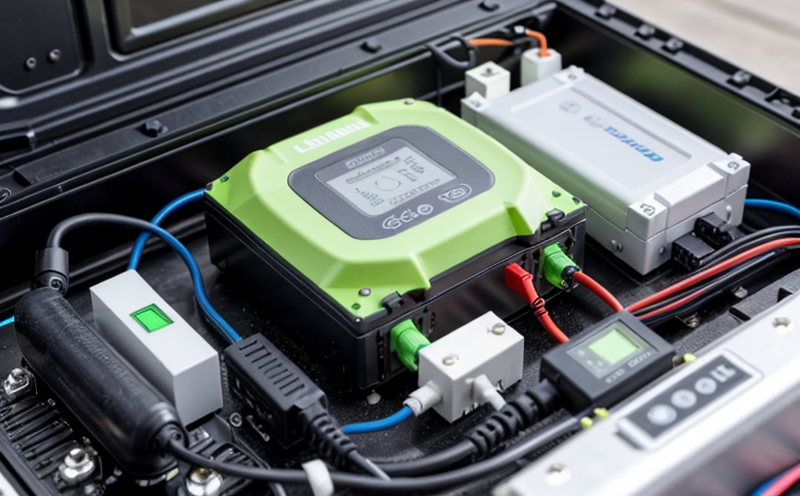IEC 61427 Lithium-Ion Battery Testing for Renewable Energy Storage Systems
The International Electrotechnical Commission (IEC) standard IEC 61427 is a critical document that sets the benchmark for testing lithium-ion batteries used in renewable energy storage systems. This standard ensures that these batteries meet stringent safety, performance, and durability requirements necessary for reliable operation in grid-connected applications.
The standard covers various aspects of battery evaluation, including electrical performance, mechanical integrity, thermal stability, and more. It is particularly important for ensuring the long-term reliability and safety of batteries used in renewable energy systems such as solar photovoltaic (PV) storage systems, wind energy storage solutions, and hybrid power plants.
IEC 61427 testing encompasses a wide range of parameters that are crucial for assessing battery performance. These include:
- Electrochemical performance
- Cycling stability
- Overcharge and overdischarge protection
- Temperature cycling
- Vibration resistance
- Safety features such as internal short-circuit protection
- Durability under real-world conditions
The testing process involves rigorous procedures to simulate the operational stresses that batteries will encounter in actual use. This includes exposing them to extreme temperatures, high and low voltage levels, and mechanical shocks.
Compliance with IEC 61427 is mandatory for manufacturers and suppliers of lithium-ion batteries used in renewable energy storage systems. Non-compliance can lead to safety hazards, performance issues, and regulatory penalties. Therefore, it is essential to ensure that the testing process meets all specified requirements as per the standard.
Testing laboratories like Eurolab are equipped with state-of-the-art facilities and experienced personnel to perform IEC 61427 testing accurately and efficiently. Our team of experts can help you navigate the complexities of this standard, ensuring your products meet international safety standards.
| Parameter | Description | Testing Methodology |
|---|---|---|
| Electrochemical Performance | Determines the battery's ability to deliver power and energy efficiently. | Battery discharge tests, impedance spectroscopy. |
| Cycling Stability | Evaluates how well a battery maintains its performance over repeated charge-discharge cycles. | Constant current cycling at defined conditions. |
| Overcharge and Overdischarge Protection | Checks if the battery can withstand extreme charging or discharging without damage. | Simulated overvoltage/overcurrent scenarios. |
| Temperature Cycling | Assesses how a battery behaves under varying temperatures to ensure it remains functional and safe. | Cycling between specified temperature ranges, monitoring performance changes. |
| Vibration Resistance | Evaluates the impact of mechanical stress on a battery's integrity and performance. | Subjecting batteries to controlled vibration environments. |
| Safety Features | Verifies that safety mechanisms like internal short-circuit protection are effective. | Simulating fault conditions and observing recovery behavior. |
In summary, IEC 61427 Lithium-Ion Battery Testing is essential for ensuring the reliability and safety of batteries in renewable energy storage systems. By adhering to this standard, manufacturers can provide products that meet global regulatory requirements and deliver consistent performance under real-world conditions.
Industry Applications
The IEC 61427 Lithium-Ion Battery Testing is widely applicable across various sectors within the renewable energy domain. Here are some key areas where this testing is particularly relevant:
| Sector | Description |
|---|---|
| Solar Photovoltaic (PV) Systems | Testing ensures that batteries used in PV storage systems can withstand environmental and operational stresses effectively. |
| Wind Energy Storage Solutions | Battery performance testing is crucial for optimizing wind energy systems' efficiency and reliability. |
| Hybrid Power Plants | In hybrid setups, batteries play a pivotal role in balancing supply and demand. Testing ensures reliable operation under varying conditions. |
| Sustainable Microgrids | Battery testing for microgrids helps ensure consistent power delivery even during grid disruptions. |
| Electric Vehicles (EV) Charging Infrastructure | Testing batteries used in EV charging infrastructure enhances safety and reliability, crucial for widespread adoption. |
| Emergency Power Systems | Battery performance testing ensures that backup systems are always ready to deliver critical power when needed. |
The diverse applications of IEC 61427 Lithium-Ion Battery Testing underscore the importance of this standard in promoting a sustainable and reliable renewable energy ecosystem. By adhering to these tests, manufacturers can ensure that their products are not only compliant with international standards but also perform reliably under real-world conditions.
Eurolab Advantages
At Eurolab, we pride ourselves on providing comprehensive IEC 61427 Lithium-Ion Battery Testing services that meet the highest industry standards. Our advantages include:
- Expertise and Experience: Our team of engineers has extensive experience in testing lithium-ion batteries for renewable energy applications.
- State-of-the-Art Facilities: We have access to cutting-edge equipment that ensures precise and reliable test results.
- Comprehensive Testing: We offer a full spectrum of IEC 61427 tests, ensuring compliance with all relevant international standards.
- Custom Solutions: We tailor our testing services to meet the specific needs of your products and projects.
- Fast Turnaround Times: Our efficient processes allow for quicker results without compromising on quality.
- Compliance Guidance: Our experts can provide guidance throughout the testing process, ensuring you understand each step.
We are committed to helping our clients achieve compliance with IEC 61427 and other relevant standards. Contact us today to learn more about how we can assist you in meeting these critical requirements.





